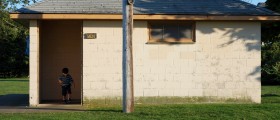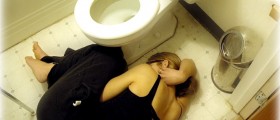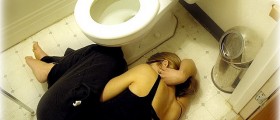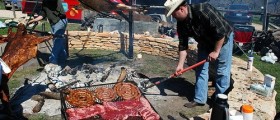
Diarrhea is defined by having three or more loose or liquid bowel movements per day. In most cases, diarrhea is a benign acute condition but it may also cause death because of the severe complications. Diarrhea is still one of the major health problems in the developing countries and the second most common cause of infant death. Complications with diarrhea occur because of dehydration and electrolyte imbalances that result from excessive loss of water. If there is blood visible in the stools, diarrhea probably results from dysentery, an inflammatory disorder of the intestine which can be fatal.
Diarrhea from bacteria
Diarrhea is often caused by bacteria. Different types of bacteria are known to cause diarrhea. Among them, the most frequent bacterial causes are Campylobacter jejuni, Escherichia coli, Salmonella, Shingella, Staphylococcus, and Yersinia. Bacterial diarrhea can affect a single person or whole groups of people who are exposed to the same contaminant. In general, symptoms of bacterial diarrhea include abdominal cramps, abdominal pain, and loss of appetite, nausea and vomiting. In general, if a patient lives in sanitary conditions with clean food and water, recovery occurs after a couple of days. But if a person is malnourished and has no access to sanitary water, diarrhea can lead to severe dehydration and even death.
Causes of bacterial infections
People may get bacterial diarrhea if they eat foods that are not prepared in a proper way. It is especially dangerous if a person that prepares food didn’t wash their hands properly. Cross-contamination is also possible, if a food becomes infected from contaminated cooking utensils, cutting boards, or other tools. Sometimes, bacterial overgrowth may occur if food has been out of refrigerator for two long or if frozen food has not stored on the proper temperature or reheated properly.
Raw foods and water
Raw foods are also common sources of bacterial infection. Unprocessed fish, oysters, fruits or vegetables that have not been washed well, are often full of bacteria, which may affect humans’ health. Undercooked food, especially meets or eggs may also cause diarrhea. Sometimes, the source of infection is water. Water from a well or stream should always be tested before consumption. Tap water is treated with chemicals and free from pathogens. Water from swimming pools and hot tubs can also cause diarrhea, if it isn’t treated with chlorine properly.
Self-help
To ensure fast recovery, patients should drink about 10 glasses of water per day and at least 1 cup of liquid every time after a loose bowel movement. Patients should eat bananas, potatoes and fruit juices, which are rich in potassium.








_f_280x120.jpg)








Your thoughts on this
Loading...